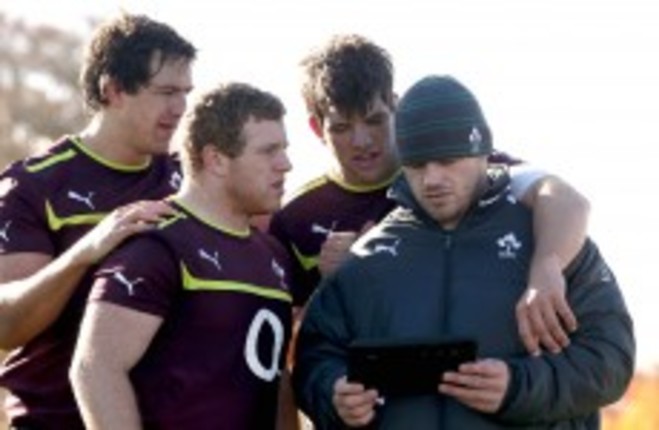1. “In the first of the documentaries charting his progress as a boxer, he revisits some of those themes, admitting that he was bullied at school because of his prowess as a cricketer and that when he was labelled fat in his early 20s he became bulimic, sticking his fingers down his throat to make himself throw up. Because of his size and bluffness, he has been treated as a hearty – the first person you look to on the field for leadership in a crisis, “someone you’d want beside you in the trenches” as his former manager Neil Fairbrother once described him to me – but in reality he is complicated, and some of his issues with binge drinking during his career may have been related to depression.”
The Guardian recently conducted an insightful interview with Andrew Flintoff on life after cricket.
2. “Richardson, too, has fond memories of Gascoigne, even though he once reversed into his car. “I never went drinking with him and Five Bellies but we did go out socially,” he says. “With Gazza, if you were driving around, people would buzz on their scooters, saying: ‘Eh, Gazza! Gazza! Gazza!Grande!‘ There was a lot of love for him shown by the city. He was a really popular guy there.”
The same could not be said for Des Walker, who struggled horribly at Sampdoria. “I maybe spoke to him once,” Richardson says. “At the start of his time in Italy. But when I went back later in the season he was having such a disastrous time my interview with him consisted of me saying ‘Des!’ as he sped away in his car.”
However, Richardson had better luck with David Platt, who was “very professional”, and Paul Ince, whom he liked enormously. “Incey was a really nice guy,” he says. “He used to ring me up for Tomb Raider tips because I was several levels ahead of him. He was a huge success in Italy. They loved him but after two years his family wanted to go back.”
People of a certain age will no doubt enjoy Sean Ingle’s piece about Italian football’s golden period and how Channel 4 were there to capture it in all its glory.
3. “AFC Wimbledon are proof that a supporter-run club can work and be a role model, certainly, for the Portsmouth Supporters’ Trust as it takes its first steps into what is essentially a hard, unforgiving workplace, sifting through the mess that others have left behind, with no guarantees that it will work out. At least Portsmouth, under their new regime, have the head start of beginning in League One and having a place to play. Wimbledon’s first game was against Sutton United, a pre-season friendly preparing for a place in the Combined Counties League, for clubs from London, Berkshire, Hampshire, Middlesex and Surrey. They lost 4-0. The next eight games were defeats before finally breaking the duck against Enfield Town in the Supporters’ Direct Cup. All things considered, it is a minor miracle that, at 5.44pm on 21 May last year, their captain, Danny Kedwell, turned to his team-mates on the halfway line at the City of Manchester Stadium, at 3-3 in a penalty shoot-out with Luton Town, uttered four words – “this is our time” – and then set off to take the kick that won the Conference play-off final and a place in the league.”
Daniel Taylor wants AFC Wimbledon to beat MK Dons in their upcoming clash, and he’s not afraid to admit it.
4. “Among wingers, the record-holder is Ludovico Nitoglia, who played 17 times for Italy without scoring. Not far behind is Clive Rees, a distinctly lively operator from London Welsh who still contrived to make 13 appearances for Wales between 1973 and 1983 – and get picked for the 1974 Lions tour of South Africa – without scoring.
Most famous non-scoring winger of the lot was Roger Baird of Scotland. He played 27 times for his country, and went on the 1983 Lions tour of New Zealand, playing in all four tests. The only time he touched down was for the Lions at Dunedin, playing in a team in which Scotland, with five starters and three replacements, was the most represented of the home nations.
Yet, as his place in the Lions test team shows, there were few doubts about Baird’s quality. He played in Scotland’s 1984 Grand Slam team and in the epic 25-25 draw against the All Blacks the previous December. He initiated perhaps the best Scottish try of that period, his superb counter-attacking run from Gareth Davies’s misjudged kick at Cardiff in 1982 starting a length of the field attack finished by Jim Calder.”
Writing for ESPN Scrum, Huw Richards examines that rare phenomenon – the non-scoring winger.
5. “There is also work still to do. It is dark, cold and wet but he pulls on the trademark floppy hat and runs back out into the night to join a training partner in their regular 15 sharp sprints up a nearby hill.
As he goes he hugs Jennifer, his lady who stood by him through all the drink and drugs-related madness after his flattening by Manny Pacquiao, and asks: ‘Would you mind getting my tea ready? The game will be kicking off.’
The pasta, greenery and tomatoes are duly waiting on the table. Then he and son Campbell are out of the hi-tech kitchen, through the kids’ playroom, past the indoor swimming pool, via the home gym and into the private cinema.
We miss kick-off but no sooner do we sit down than we’re on our feet again, in dismay. Ajax greet us by going two up. ‘What’s happened to defending in this country?’ Hatton demands to know, banging the leather arm of his seat.”
Jeff Powell’s fascinating, intimate look at the life of Ricky Hatton is well worth taking a few minutes out of your day to read.

